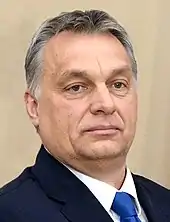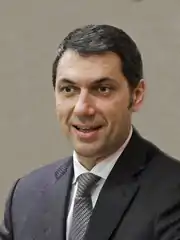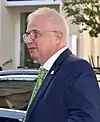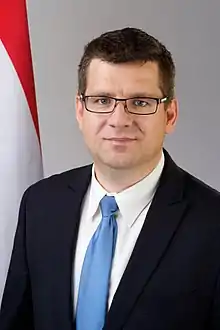Third Orbán Government
The third government of Viktor Orbán was the Government of Hungary between 6 June 2014 and 18 May 2018. Prime Minister Viktor Orbán formed his third cabinet after his party-alliance, Fidesz and its coalition partner, Christian Democratic People's Party (KDNP) altogether won a qualified majority in the 2014 parliamentary election.
| Third Orbán Government | |
|---|---|
71st Cabinet of Hungary | |
| Incumbent | |
 | |
| Date formed | 6 June 2014 |
| Date dissolved | 18 May 2018 |
| People and organisations | |
| Head of state | János Áder |
| Head of government | Viktor Orbán |
| Deputy head of government | Zsolt Semjén |
| Member party | Fidesz, KDNP |
| Status in legislature | Coalition |
| Opposition party | MSZP, Jobbik, LMP |
| Opposition leader | Gyula Molnár, Gábor Vona |
| History | |
| Election(s) | 6 April 2014 |
| Predecessor | Second Orbán Government |
| Successor | Fourth Orbán Government |
List of Ministers
Following the 2014 parliamentary election, Fidesz–KDNP gained 133 seats in the National Assembly. The government majority of the parliament elected Viktor Orbán as a fully-fledged prime minister on 10 May, but his third cabinet formed only 6 June.
The Ministry of Foreign Affairs transformed into the Ministry of Foreign Affairs and Trade, while the Ministry of Rural Development and the Ministry of Public Administration and Justice were renamed to Ministry of Agriculture and Ministry of Justice, respectively. On 17 October 2015, the Ministry of the Prime Minister's Cabinet Office was established. Two ministers without portfolio were appointed in May 2017 and October 2017.
| Office | Image | Incumbent | Political party | In office | |
| Prime Minister |  |
Viktor Orbán | Fidesz | 10 May 2014 – 10 May 2018 | |
| Deputy Prime Minister Minister without portfolio for National Politics |
 |
Zsolt Semjén | KDNP | 6 June 2014 – 18 May 2018 | |
| Minister of the Prime Minister's Office |  |
János Lázár | Fidesz | 6 June 2014 – 18 May 2018 | |
| Minister of the Prime Minister's Cabinet Office | .jpg.webp) |
Antal Rogán | Fidesz | 17 October 2015 – 18 May 2018 | |
| Minister of Foreign Affairs and Trade |  |
Tibor Navracsics | Fidesz | 6 June 2014 – 13 September 2014 | |
.jpg.webp) |
Péter Szijjártó | Fidesz | 23 September 2014 – 18 May 2018 | ||
| Minister of Interior |  |
Sándor Pintér | Independent | 6 June 2014 – 18 May 2018 | |
| Minister of Justice |  |
László Trócsányi | Independent | 6 June 2014 – 18 May 2018 | |
| Minister of National Economy |  |
Mihály Varga | Fidesz | 6 June 2014 – 18 May 2018 | |
| Minister of Human Resources | .JPG.webp) |
Zoltán Balog | Fidesz | 6 June 2014 – 18 May 2018 | |
| Minister of National Development |  |
Miklós Seszták | KDNP | 6 June 2014 – 18 May 2018 | |
| Minister of Agriculture |  |
Sándor Fazekas | Fidesz | 6 June 2014 – 18 May 2018 | |
| Minister of Defence |  |
Csaba Hende | Fidesz | 6 June 2014 – 9 September 2015 | |
.jpg.webp) |
István Simicskó | KDNP | 10 September 2015 – 18 May 2018 | ||
| Minister without Portfolio responsible for the planning, construction and commissioning of the two new units at Paks Nuclear Power Plant |
János Süli | Independent | 2 May 2017 – 18 May 2018 | ||
| Minister without Portfolio responsible for the development of towns with county rights |
 |
Lajos Kósa | Fidesz | 2 October 2017 – 18 May 2018 | |
Policy
Immigration
During the 2015 European migrant crisis the government initiated the erection of the Hungary-Serbia barrier to block entry of illegal immigrants.[1] Just like the other Visegrád Group leaders, the government was against any compulsory EU long-term quota on redistribution of migrants.[2]
On 24 February 2016 the prime minister announced that the government would hold a Referendum on whether to accept the European Union's proposed mandatory quotas for relocating migrants.[3] He also said it is "no secret that the Hungarian government refuses migrant quotas" and that they will be campaigning for "no" votes. Orbán argued that the quota system would "redraw Hungary's and Europe's ethnic, cultural and religious identity, which no EU organ has the right to do".[4] On 5 May, after examining the legal challenges, the Supreme Court (Kúria) allowed the holding of the referendum.[5]
In the autumn of that year the no vote won with 3,362,224 votes or 98.36% of the total number of votes.
Free Sunday
Fidesz and the Christian Democratic People's Party (Hungary) has supported the restriction on Sunday shopping ("free Sunday", as they called) for a long time, citing Christian values. Parliament voted on the issue on December 14, 2014[6] and the law came into effect on March 15, 2015[7] (a Sunday on which shops would have been closed anyway, the day being a public holiday in Hungary). Public opinion was predominantly against the decision. Three polls done in the spring of 2015 registered an opposition of 64% (Szonda Ipsos), 62% (Medián) 59% (Tárki). By the end of May, according to a poll by Medián, 72% of those polled disliked the new law, even the majority of Fidesz-KDNP voters were against it.[8] Opposition parties and private persons tried to start a public referendum several times. By November 2015 there were 16 such attempts, but none of them were approved, for various bureaucratic reasons,[9] until in early 2016 one of these attempts, initiated by the Hungarian Socialist Party, was finally successful. The government, rather than being forced to hold the referendum (which could have been interpreted as a huge success for the opposition party, even though the law was opposed by the majority of Fidesz voters too) lifted the ban in April 2016.[10]
References
- Troianovski, Anton (19 August 2015). "Migration Crisis Pits EU's East Against West". Wall Street Journal. Retrieved 19 August 2015.
- Ian Traynor. Refugee crisis: east and west split as leaders resent Germany for waiving rules . The Guardian, 5 September 2015.
- "Migrant crisis: Hungary to hold referendum on EU quota plan". BBC News. 24 February 2016. Retrieved 26 May 2016.
- "Orbán: Népszavazás lesz a betelepítési kvótáról". Magyar Nemzet. 24 February 2016. Retrieved 26 May 2016.
- "Lehet népszavazni Orbánék kérdéséről" (in Hungarian). Népszabadság. 2016-05-03. Archived from the original on 2016-06-03. Retrieved 2016-05-10.CS1 maint: bot: original URL status unknown (link)
- KDNP.hu. "Megszavazta az Országgyűlés a szabad vasárnap bevezetését".
- HVG.hu (2015-03-15). "Vasárnapi boltzár: "Annyian voltak, mint a sáskák"".
- Origo.hu (2015-06-30). "Már a Fidesz-szavazóknak is elegük van a vasárnapi zárva tartásból".
- 444.hu (2015-11-11). "Bármi áron meg kell akadályozni, hogy népszavazás legyen a vasárnapi zárva tartásból".
- usnews.com (2016-04-11). "Hungary's government says it has asked parliament to repeal a very unpopular law banning most retail stores from opening on Sundays".